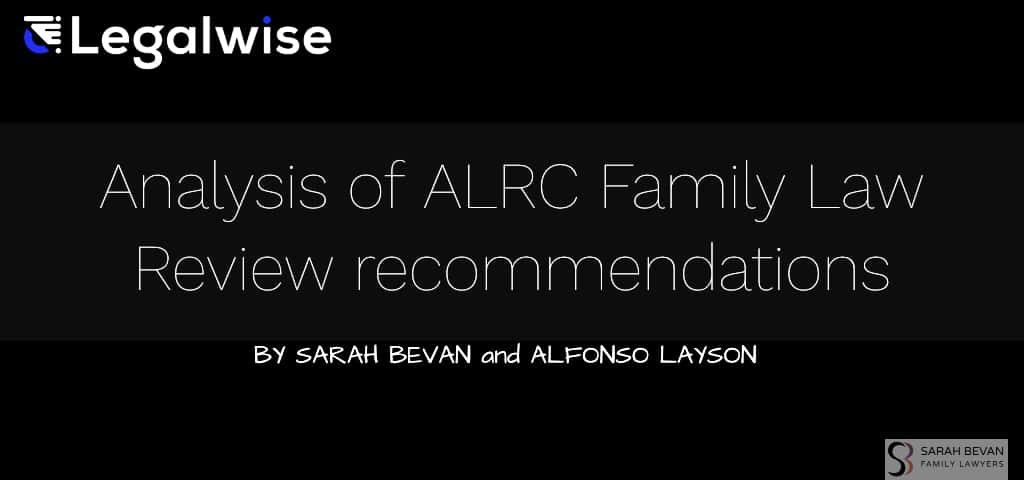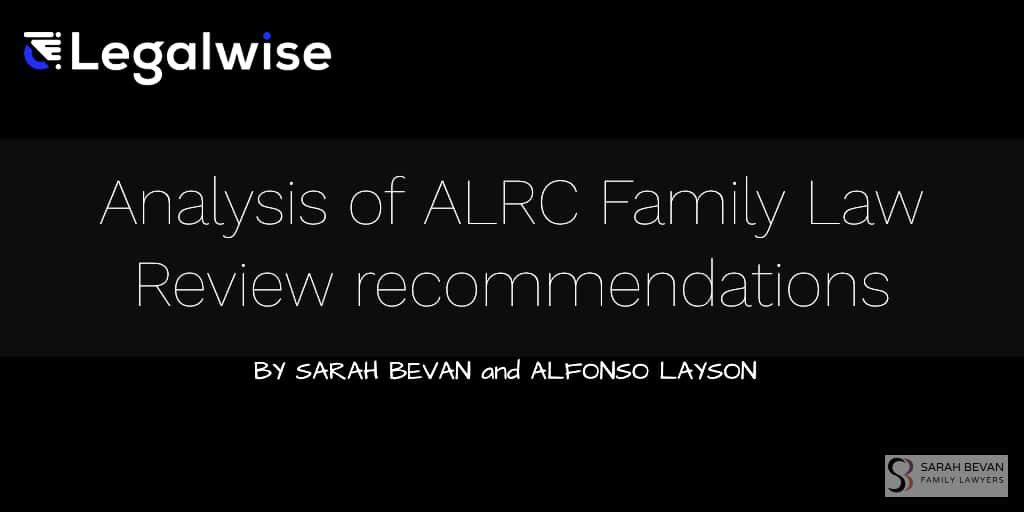- Sydney Family Lawyers
- (02) 9633 1088
- mail@sbfamilylawyers.com.au
Analysis of ALRC Family Law Review recommendations
The following is an article as published on Legalwise.com.au, on May 2nd, 2019.
Sarah Bevan and Alfonso Layson of Sarah Bevan Family Lawyers discuss the long-awaited report from the Australian Law Reform Commission Review of the Family Law System and ask: Does it live up to the expectations of the public and legal profession and, are there any positive recommendations to remedy the issues of the much-maligned and underfunded family law system?
Introduction
On 9 May 2017, the Turnbull Government spearheaded an initiative to direct the ALRC to conduct its first comprehensive review of the much-maligned family law system. This was in direct response to criticism surrounding the delays within the family law system, the increasing costs to litigants and the lack of physical and financial resources available within the Family Law Courts. The report was completed on 31 March 2019 and was released to the public a week after the crossbench voted against debating the Bill, which had passed the Lower House.
Recommendations of the Report
In simplistic terms the recommendations contained in the report were broken into the following subcategories:
- Closing the jurisdictional gaps for children within the Federal Family Law Courts, the State and Territory Child Protection Systems, and the state and territory responses to family violence, including by directing Family Law disputes to the States and Territories.
- The simplification of the factors surrounding the making of children’s orders.
- Adopting stricter case management to provide for consequences for parties and their representatives who do not attempt to resolve matters expediently.
- Assisting in compliance with children’s orders and thereafter limiting the interim appeal process.
- Simplifying property division, including a starting position that contributions during a relationship are equal.
- Encourage Alternative Dispute Resolution (ADR) by increasing the requirement for matters to go through the ADR process.
- Redrafting the Family Law Act 1975 to make it more simplified and user-friendly.
There were 60 recommendations made across these subcategories that ranged from the redrafting of legislation to mandating certain actions of potential litigants. The report ultimately recommended that a singular Court system would be the idealistic but not an immediate solution.
Possible effects of Implementing the recommendations
It is important to consider the impact of some of these recommendations from a practical standpoint and to consider whether or not the implementation of the recommendations would do more damage than long term good.
Bridging the Jurisdictional Gap:
Perhaps the costliest of all the recommendations is the abolition of the Federal Family Courts with the Australian government to consider options to establish State and Territory Family courts in all jurisdictions. From a practical perspective, it is difficult to understand how this recommendation would lead to cases being run more efficiently. Merely one consideration is that Australians are typically mobile, and State borders mean little on a practical basis. So for families who cross jurisdictional borders, their cases may well be subject to unnecessary complication, and potentially cost and delay.
Further, family law demands specialised Judges with specialised skill, experience and training. Unless there are to be such Judges appointed to the State Courts, then families will inevitably suffer.
Children’s Matters
One of the recommendations relates to amending Section 61DA, by replacing the presumption of equal shared parental responsibility with a presumption of joint decision making on long term issues.
There is little doubt that Part VII of the Act, relating to children, is complicated and lengthy, particularly after the 2006 amendments. For example, even many lawyers are unaware of the difference of the presumption not applying due to family violence versus it being rebutted if in the children’s best interests. Most self-represented litigants simply have no grasp at all of this concept.
Therefore simplifying the language is potentially very positive. But care is needed in such redrafting to ensure that any changes do not give parents an additional reason or excuse to fight for primary care in the belief that such primary care will mean they have greater say in decision making. Care is also needed to ensure that appropriate protection is given to those parents in a family violence situation, as being forced into ongoing joint decision making can be a means of one parent attempting to control or coerce the other parents on a long term basis.
Simplifying property division:
There were numerous recommendations in relation to simplifying the property division aspects of family law. Some positive recommendations were to:
- Give power to Court Registrars to consider urgent applications for spouse/partner maintenance. The irony of such maintenance cases is the significant cost to a litigant to obtain financial redress from their former partner/spouse. Allowing Registrars to make decisions on spouse/partner maintenance would both alleviate the judicial caseload and importantly provide assistance to destitute parties.
- Develop a protocol of the Court and the Australian Financial Complaints Authority (AFCA) for dealing with jurisdictional overlap relating to debts of parties. The recommendation provided that any dispute relating to the enforceability of a debt against one or both parties under the National Consumer Credit Protection Act 2009 be dealt with by AFCA, and disputes about the allocation of the debt between parties in family law proceedings be dealt with by the Court.
Probably the most controversial recommendations are that a presumption should be applied that superannuation accrued during the relationship is to be split evenly post-separation and that contributions during the relationship should be considered equal. Care must be taken when suggesting that an equal division is a go-to position in property matters. It is a considerable strength of our current system that it is responsive to each family’s unique circumstances and that it takes into consideration various types of contributions. Applying this presumption could mean that many people have their significant contributions overlooked, and effectively undervalued. It would certainly make the process easier for lay people to understand, but this should not be at the expense of proper consideration of unique circumstances.
Conclusion
The overarching findings of the report suggest that simplification of the family law system is the way forward, and for it to be accessible to litigants at State level. The problem which remains is that as Australian society and the structure of families evolve and become more complicated, so too does the complexity of family law increase. An established specialist Court system is needed to deal with the changes that our society faces. While it is always important to consider how law and processes can be changed to meet the needs of Australian society, funding of the system must also keep pace with the increased demand on the system.
Sarah Bevan was admitted as a lawyer in New South Wales in 1999. She established Sarah Bevan Family Lawyers in 2002, which has grown significantly from the sole practitioner firm that it was initially. Sarah has always practised exclusively in all aspects of family law, including niche areas such as surrogacy, complex international matters, and providing expert evidence for overseas jurisdictions in Hague Convention matters. Sarah obtained her Family Law Specialist Accreditation in 2005 and was accredited as an Arbitrator in 2008. In 2007, Sarah undertook Collaborative law practice training to provide her clients with alternative dispute resolution processes and encourage effective settlement negotiations. She is also a member of the Law Society of NSW, Family Law Section of the Law Council of Australia, AIFLAM, Panel of Independent Children’s Lawyers, Collaborative Professionals NSW, International Academy of Collaborative Professionals and AEA. Sarah is a regular presenter of continuing legal education in family law. Contact Sarah atsarah.bevan@sbfamilylawyers.com.au or connect via LinkedIn .
Alfonso Layson was admitted as a lawyer in New South Wales in 2012 and has been recognised as an Accredited Specialist in Family Law by the Law Society of NSW. Alfonso has been an integral part of Sarah Bevan Family Lawyers for over 6 years and is a Senior Associate at the firm. Alfonso has always practised exclusively in all aspects of family law, including niche areas such as surrogacy law, both domestic and international surrogacy arrangements, adoption, international cases and cases involving complex structures. He has also been the primary lawyer on many difficult and highly unique cases, including the first Australian decision under the Hague Convention on Child Protection. Contact Alfonso atalfonso.layson@sbfamilylawyers.com.au or connect via LinkedIn .
You can also connect with Sarah Bevan Family Lawyers via Facebook or LinkedIn
.





